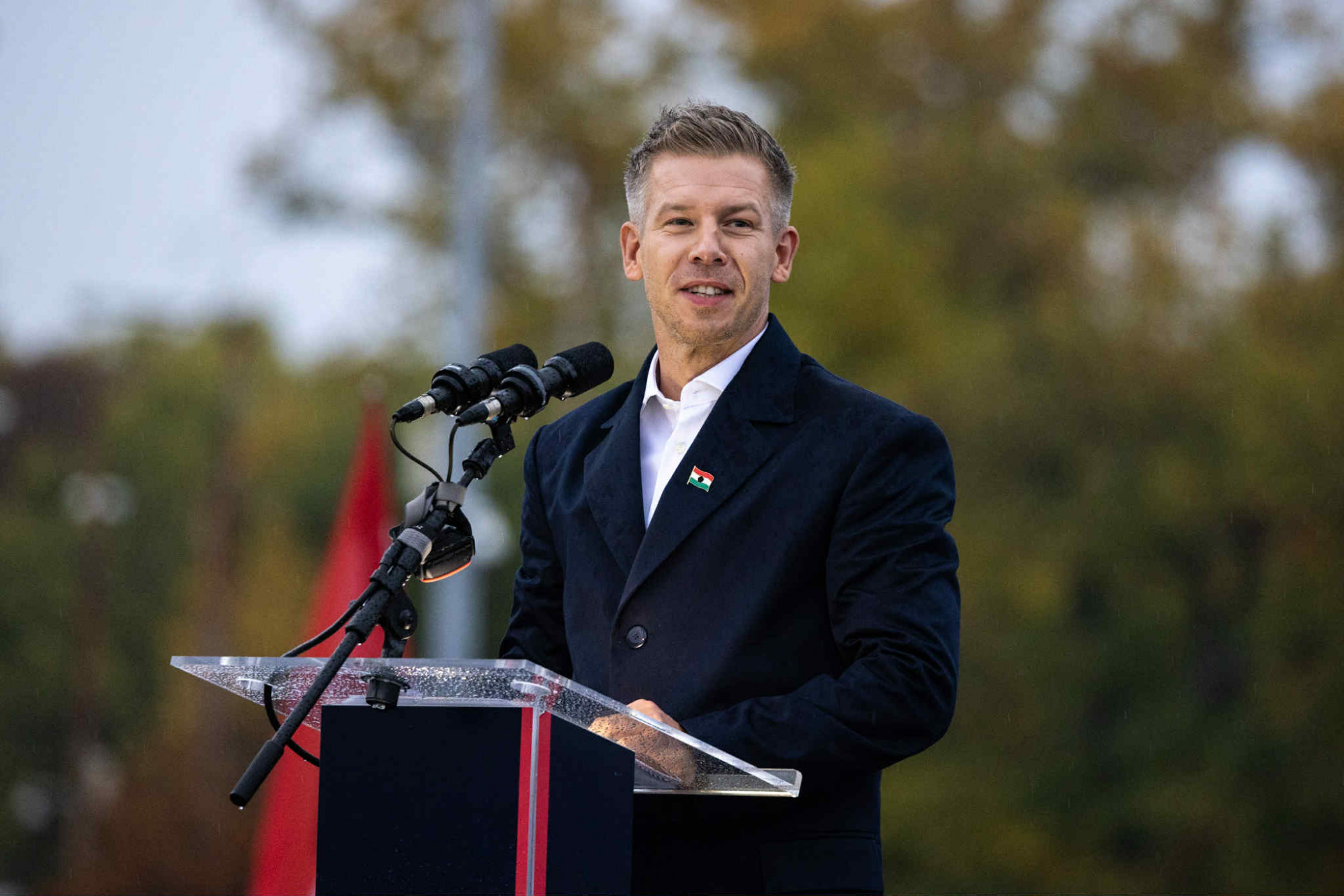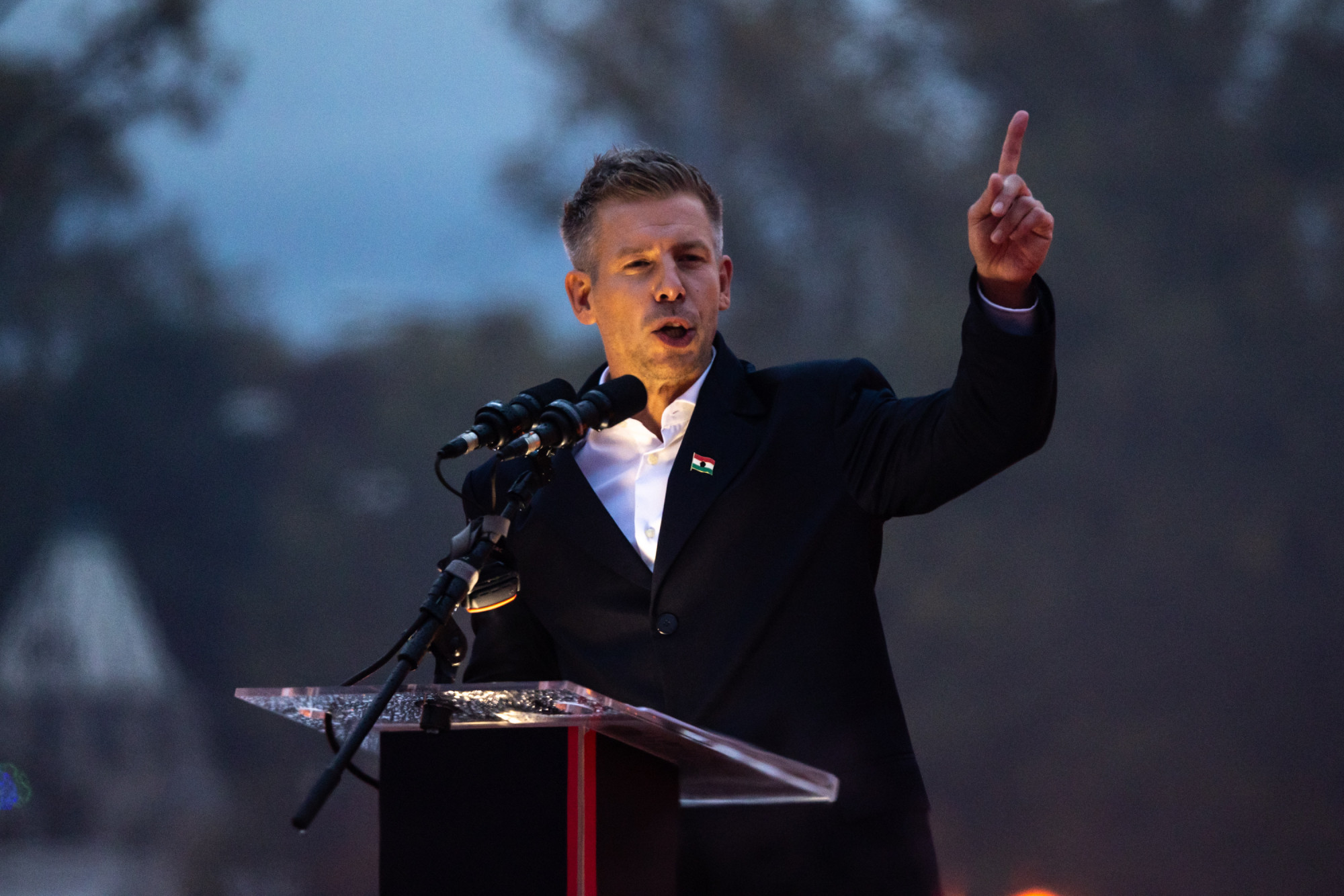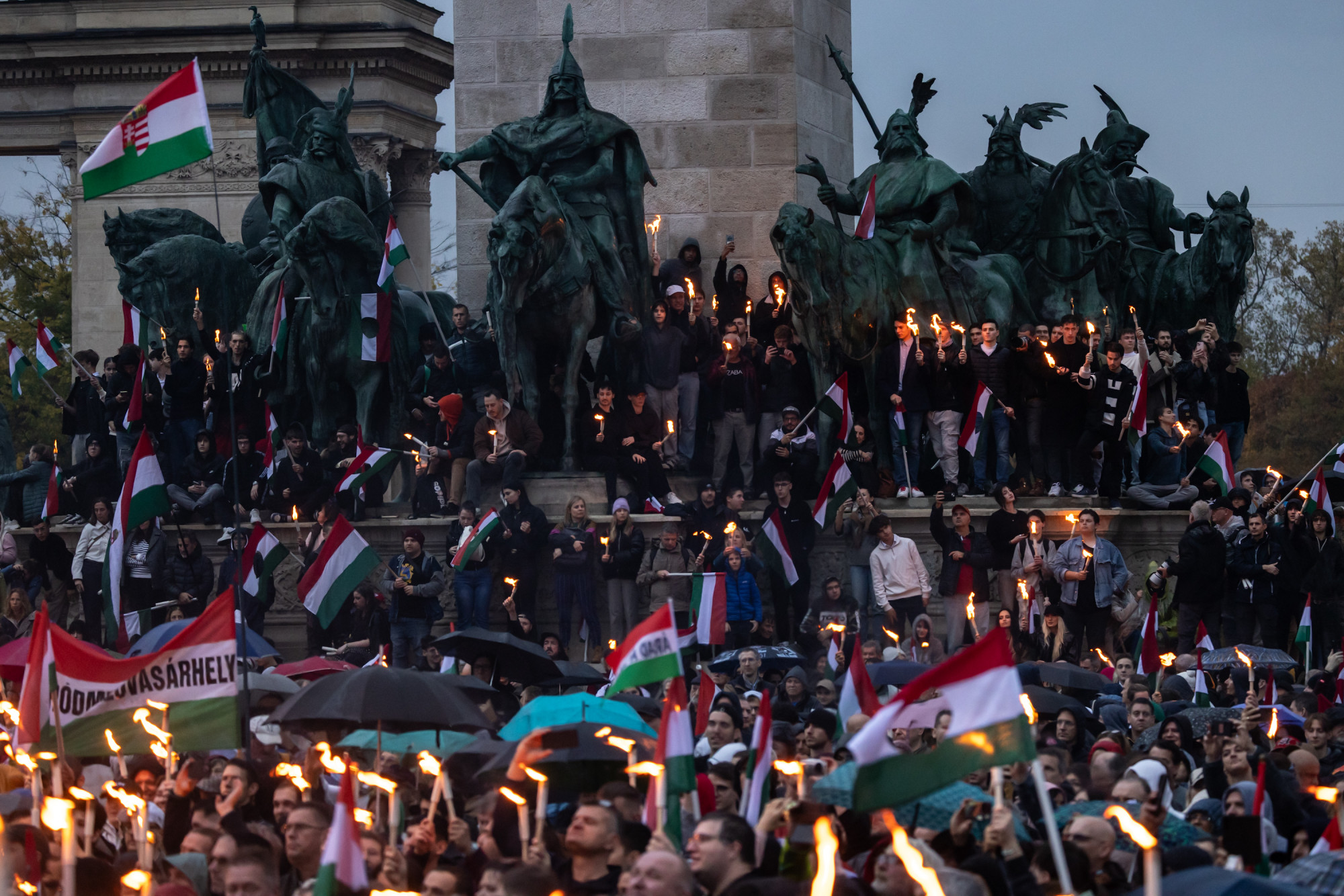Péter Magyar took to the stage with a spectacular arrangement that rivaled Viktor Orbán's frontal, megalomaniac stage: a restrained stage was built almost in the middle of Heroes' Square, surrounded by the crowd, and Magyar was able to speak to the gathered crowd as a child of the people. Meanwhile, in the background, he added a revolutionary, but at least class trip-like atmosphere to all of this, with people climbing onto the statues to listen to him. Then, when it got dark, the torches made the arrangement even more spectacular. (You can watch and read Péter Magyar's speech here.)
It was a marathon speech, lasting more than an hour, and several ideas recurred in it several times, but the war and Ukraine were missing. Magyar did not say a single word about them, obviously deliberately and demonstratively not wanting to give in to Fidesz's propagandistic thematization.
However, the speech was permeated with gentleness in response to Orbán's belligerence, division, and pressure with a continuous decisive struggle, as well as the motifs of serenity, unity, cooperation across right- and left-wing worldviews, and joint construction. In fact, at one point he even openly told Fidesz that there was nothing wrong with them only realizing that they should vote for Tisza during the election. It was also mentioned several times, even if not always directly, that Orbán = old Kádár, and October 1956 = April 2026, and that neither Brussels, Washington, nor Moscow should interfere in our lives, constantly mentioning the three cities together at certain points in the speech.

Hungary started with the past, a Soviet boot stood on the chest of our country, but it didn't take long for the first"it doesn't matter how you see the world, come with us" type message: the 1956 revolution was the miracle itself, so many different people came together in unity.
He told the story of October 23rd at length, the University of Technology, the first shot fired, with many references to unity and the Hungarians' irrepressible, ever-resurfacing (meaning: even now) desire for freedom: the boys and girls of Pest asked for nothing more than to be able to live freely in their own country, the flame of freedom has never been extinguished since, the Hungarians suddenly said that enough was enough, there will always be those who dare to stand up for freedom, who will rekindle the flame, and so on.
After 56 came 89, Magyar recalled Viktor Orbán's speech at the time, given on the steps of the Műcsarnok, he said, 36 years have passed, and today it is not difficult to notice the tragic irony: today Orbán is the Kremlin's most loyal ally, he has built a centralized system and is ruling his country with fear, he has been lying to his own people for years. Magyar drew many parallels between the Soviet leadership of that time and the current one, and in his opinion, the last sentence of Orbán's speech at that time could be heard again:"If we have enough courage to want all this, then, but only then, can we fulfill the will of our revolution."
Magyar also hinted that he would have liked to speak on the steps of the Műcsarnok now, but he was not allowed to do what was possible even under Soviet rule.
Despite the crushing of the revolution, the embers were still burning, said Magyar, and then came the clear Kádár-Orbán parallel, saying that history does not forget, it just waits.
“Every leader who is divided and turns against his people will have his Kádár moment, and each one decides for himself whether to experience it by standing aside in time, in the solitude of his own study, or by being shamed in public. The majority of Hungarians know and feel that 36 years after 1989, it would be better not to drag it out until another national tragedy, when the new Kádár, who has tortured our souls with poison, will come to terms with his conscience.”
He reinforced this image at a later point in his speech, when he said that it had now become clear that Orbán's only problem with the previous system was that he was not in control of it.

He then spoke at length about his country tour, emphasizing with some specific stories the openness to dialogue, joint construction, cooperation, and humanity, and also sent a message to those who question his ability to govern by saying that based on his country tours, the Tisza does indeed feel what needs to be done in the country.
Livelihood was given relatively little space in the ceremonial speech, but it was mentioned nonetheless: According to Magyar, there were 56 social uprisings, with workers and students together demanding the dignity of everyday life, fair wages, housing, and affordable food. They wanted a country where bread and freedom were two sides of the same truth.
Then the change came quickly:"The heroes of '56 came from many directions, but they wanted one thing, a free Hungary," and the revolution was not just in Budapest, he returned again to the message that the Tisza welcomes everyone.
A penetrating foreign policy outlook has come: Moscow and Washington are winking at each other above our heads, the lesson is: peace, the promise is valid as long as it is kept. We must bravely confront the overwhelming force.
At this point, Magyar tried to convince the Fidesz supporters a little:
Not all of the heroes of 56 were born revolutionaries, many were afraid, many were silent, some compromised with the authorities, but when history knocked on the door, they realized that love of country is worth more than any previous decision, this message is still valid today.
We are not Fidesz or Tisza, we are not right or left, we are Hungarians today, he said.
After unity, gentleness:"What is needed now is not a change based on revenge or anger, but rather construction, a cheerful, courageous, decisive, humane change of regime. Let us say it: the Hungarian homeland does not belong to politicians, parties, or oligarchs, but to the people. We are now reclaiming this homeland," he said, then emphasized the importance of freedom.
We don't have left or right-wing martyrs, we only have martyrs, he said, then asked for 56 seconds of silence to mark the beginning of a new, national reconciliation.

In the last block, Magyar spoke confidently about winning the elections and spoke in a declarative manner about what they would do. In addition to the already known promises, he also said that they would open the agent files, announce a program of national reconciliation, heal the wounds caused to each other, and then come the program of a Working Hungary, tax cuts, a wealth tax on billionaires, etc.
Mentioning national reconciliation, he again shifted his voice to the other side of the field, quasi-excusing the Fidesz supporters and the Tisza haters: it is not Hungarians who are standing against Hungarians, but rather 3-4 thousand politicians, criminals, or even oligarchs who have taken our country hostage and are trying to incite us against each other, he said.
The closing was one of mobilization and enthusiasm, we are not afraid, we will do everything, we are worthy of the legacy of 56, the Tisza is flowing,
"you know, and the fearful power knows, that Tisza will win this election, not by a little, but by a lot",
"but this will require everyone. Stay peaceful, stay cheerful, show the more humane face of Hungary."

